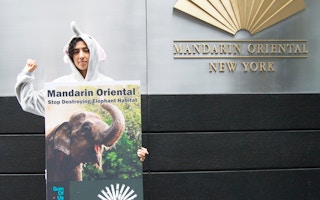A high-profile campaign exposing the links between luxury hotel chain Mandarin Oriental and Indonesian palm oil company Astra Agro Lestari’s (Astra) forest destruction in Indonesia has paid off, with the palm oil giant announcing on Thursday that it will immediately put a halt on deforestation.
To continue reading, subscribe to Eco‑Business.
There's something for everyone. We offer a range of subscription plans.
- Access our stories and receive our Insights Weekly newsletter with the free EB Member plan.
- Unlock unlimited access to our content and archive with EB Circle.
- Publish your content with EB Premium.
Astra and all its contractors in Indonesia will not convert any land to plantations for now, and the company is in the process of formulating a detailed sustainability policy for the first time.
The policy will include requirements on ensuring that land found to have a high carbon stock or high conservation value is not developed on, said the statement.
Astra will also appoint technical consultants and work with stakeholders to ensure that it is eligible to join the Indonesian Palm Oil Pledge. This is a commitment by four palm oil giants - Golden Agri Resources, Wilmar International, Cargill, and Asian Agri - along with the Indonesia Chamber of Commerce and Industry to produce palm oil in an environmentally and socially responsible way.
The moratorium also brings Astra one step closer to joining the ‘no deforestation, no peat, no exploitation’ policies set down by other palm oil giants such as Wilmar and Musim Mas, both of which buy palm oil from Astra.
Astra’s announcement comes less than a month after Forest Heroes launched a campaign called ‘She’s Not a Fan’ against Mandarin Oriental, spoofing the company’s advertising campaign where celebrities are shown to be fans of the luxury hotel chain.
“
People around the world and endangered elephants are celebrating today.
Hanna Thomas, palm oil campaigner, SumOfUs.org
The campaign produced an investigative report, photographs, and drone footage which showed that Astra - whose parent company Jardine Matheson Holdings owns a majority share in Mandarin Oriental - was clearing forests in Indonesia, violating the human rights of forest communities, and destroying the habitats of critically endangered Sumatran elephants and tigers.
Campaigners now welcomed Astra’s move, calling the moratorium a critical first step to protect Indonesia’s rapidly disappearing rainforests.
Vemund Olsen, senior policy advisor, Rainforest Foundation Norway, one of the organisations behind the campaign, said: “we commend Astra for moving quickly to respond to concerned citizens and investors around the world”.
“Astra now needs to bring transparency to its work by joining other companies in disclosing its plantation locations and those of its suppliers,” he added.
Forest Heroes also urged Astra to restore an area of forest and peat equivalent to what it has cleared in the past, and use its clout in Indonesia to support government reforms on sustainable palm oil.
Astra’s director Joko Supriyono, who also heads the Indonesian Palm Oil Grower’s Association (GAPKI), has previously advocated for weakening forest protection measures rather than strengthening them.
Glenn Hurowitz, chairman of Forest Heroes, noted: “It’s time for GAPKI to become a force for conservation and responsible development, rather than fighting to maintain the old status quo.”
The campaign was also seen as a testament to the power of citizen action, said the activists who were behind the effort. To draw attention to the issue, protestors dressed as elephants paraded outside Mandarin Oriental properties around the world,
Forest Heroes also called on the public to sign a petition to Ben Keswick, who is managing director of Jardine Matheson, chairman of Mandarin Oriental, and a board member of Astra, to stop Astra’s forest destruction.
Hanna Thomas, palm oil campaigner with SumOfUs.org said that “people around the world and endangered elephants are celebrating today”.
“But we will be watching closely to ensure that lasting change is made on the ground”.










